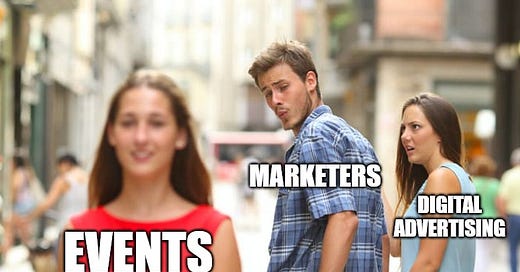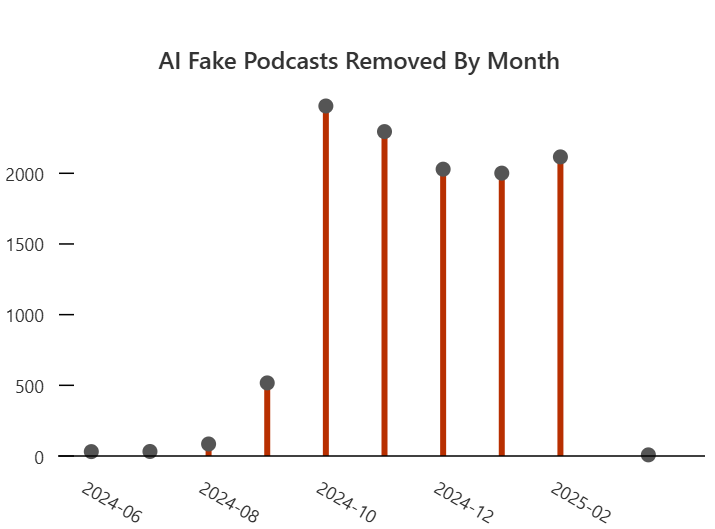Marketing Dojo #100: 🤝 Handshakes > Hashtags #️⃣
Events are back and how, Chegg takes Google to court, Pinterest is an AI wasteland and more.
Just like that, it's a 100!
It's been such a joy and privilege to show up week after week.
When I hit publish on the 1st issue of Marketing Dojo in January 2023, I had no idea I would still be going strong in 2025.
Next week, I’ll take a short break to focus on other writing projects (hopefully productive, definitely necessary!).
But for now, thank you for reading, sharing, and keeping this going. Here’s to the next milestone! 🚀
Here’s what we will cover in this week’s newsletter:
📅 Events are the comeback kids of 2025
🤖 AI slop claimed its latest victim
🎙️ Fake podcasts
⚖️ Would you sue Google?
And more.
From URL to IRL: The Marketing Pivot
A few weeks ago, I attended a B2B marketers' lunch, and the consensus was clear—investment in in-person events is climbing.
Then came Gartner's marketing predictions, which made me do a double take: By 2028, mass digital detoxing will force CMOs to spend 70% of their marketing budgets on offline channels to engage customers better.
Let's put this into perspective. COVID-19 catapulted digital spending to unprecedented heights. Numbers vary depending on the sources, but 72% of total marketing spending went to online efforts in 2024.
So what's driving this potential return to offline marketing?
First, there's digital fatigue. Our target audiences are drowning in emails, social posts, and banner ads. Online attention is increasingly fragmented and challenging to capture.
Second, ROI on digital channels is showing signs of diminishing returns. Rising acquisition costs across platforms have many marketers questioning the sustainability of their digital-heavy strategies. Remember when Facebook ads were dirt cheap, and Instagram engagement was through the roof? Those days are long gone.
Third, authenticity has become currency. Offline marketing—especially events—allows companies to forge genuine human connections that can't be replicated through a screen.
According to a report by Accor and Globetrender, there's an anticipated upswing in investment in the meetings and events sector. An impressive 80% of industry experts surveyed predict an increase in event spending, with 30% expecting the rise to surpass 25%.
Will offline marketing hit 70%? I doubt it. But one thing is sure: we're on the cusp of a radical shift in marketing priorities.
Are Google’s AI Overviews Innovating or Exploiting?
Google’s AI Overviews—like many large language models—scan massive amounts of online content, pulling key points from articles, blogs, and forums and summarizing them into quick answers—often without sending users to the original sources.
Last week, Chegg—the online education company—filed a lawsuit against Google, claiming its AI Overviews have devastated traffic and revenue. Here’s what they argue:
🔹 Traffic loss: AI Overviews have slashed click-through rates, cutting website visits and revenue.
🔹 Antitrust concerns: Google is tying search visibility to content for AI summaries, potentially violating antitrust laws.
🔹 Unauthorized content use: Google allegedly trained its AI on Chegg’s database of 135 million Q&As—without compensation.
Chegg’s concerns are valid, and I’m surprised more brands and publishers aren’t pushing back.
Chegg is fighting for survival—its valuation is down 99% from its peak, and it’s haemorrhaging subscribers. But the questions it’s raising affect everyone—from news outlets to bloggers to brands that rely on content marketing.
Will other publishers join the fight? The economics say they should, but fear of Google’s retaliation might keep them on the sidelines.
A strong lawsuit could set a precedent and force platforms to compensate content creators fairly. Chegg alone may not shake the system, but its lawsuit might inspire others—and if enough follow, this could gain serious momentum.
What do you think? Is this the start of a larger reckoning for AI content usage?
Fake Pins, Fake Blogs, Real Problem
Pinterest, once the go-to platform for authentic inspiration, is becoming overrun with AI-generated content. And users are starting to notice.
AI slop—low-quality, mass-generated content churned out by AI tools—is now omnipresent.
As per a study by Originality.ai
50% of all LinkedIn long-form articles were found to be AI-generated bland
AI-generated content on Medium increased from 3.4% in 2018 to just over 40% in 2024.
And now AI slop is claiming Pinterest.
Futurism article found that 6 of the top 12 recipe pins were AI-generated—only one was marked as synthetic. My experience searching for travel destinations was the same. Virtually every top pin led to an AI-generated blog designed solely to serve ads. The same pattern appears across recipes, home decor, fashion, and art categories.
What makes this particularly problematic is Pinterest's silence: no acknowledgement, no policy updates, no algorithmic tweaks.
The business model behind this AI content creation is both clever and concerning. Some content creators reportedly make up to $10,000 monthly through AI-generated Pinterest content. Their formula is simple:
Use AI to mass-produce pins across popular categories
Create fake blogs with AI-generated author profiles
Fill these sites with ads
Game Pinterest's algorithm for maximum visibility
The real victims here are the users and legitimate creators.
Have you noticed this shift on Pinterest? Are your searches turning up more synthetic content than genuine pins? I'm curious about your experience with this AI onslaught.
ListenNotes Is Doing What Big Platforms Won’t.
ListenNotes, a search engine for podcasts, is showing much bigger platforms how to handle AI-generated content - transparently and swiftly.
In September 2024, Google's NotebookLM introduced a game-changing feature: turn any research paper, article, or essay into a natural-sounding podcast.
It was a brilliant tool, widely praised, and I'm a big fan of it.
But as with many other AI tools, it led to a rapid infestation of AI-generated podcasts.
ListenNotes has started publicly sharing the number of podcasts it has detected and removed for being AI-generated.
Kudos!
Short Stuff:
Instagram’s algorithm update erroneously encourages violent and gory content (Insta’s oops moment).
Bluesky publicly launched its Instagram alternative Flashes (The only hope of free social media).
Reddit’s CEO confirms a paywall coming soon for some of its content (gotta bring up those subscriber numbers).
That’s a wrap on this week. Thank you for your time and attention. If you liked this week’s newsletter or found something interesting, please give me a like ❤️ or drop a comment🗨️. Your support helps drive the newsletter's discoverability.
I will see you in your inbox in a couple of weeks.
Regards,









Very well done Garima. 100th post, with ever interesting inputs and marketing ideas from across the internet. Keep it up!